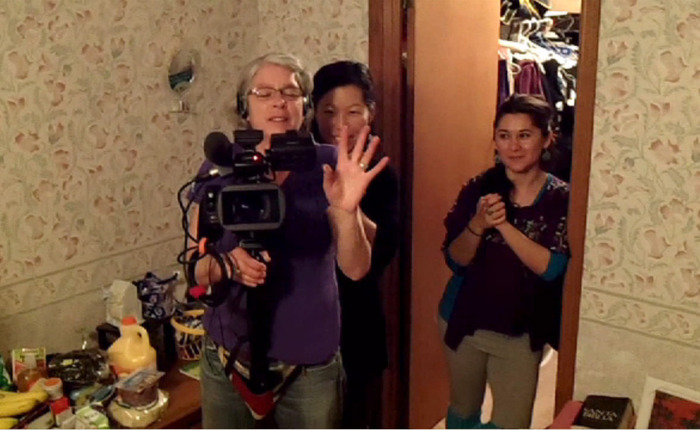![22 migrant women live in this South Ontario house]()
22 migrant women live in this South Ontario house
About the film
The feature documentary MIGRANT DREAMS weaves the lives of migrant women from Mexico, Thailand and Jamaica who comprise Canada’s temporary global workforce. While in Canada they undergo great travails to support their families back home and they also have a unique opportunity to dream new lives amidst hardship. These women may come from different parts of the world. But what they share in common are work environments that demand the very most out of them for the very least this country has to offer.
Migrant women work in hotels cleaning rooms, greenhouses tending flowers, in factories sorting fruit or in the fields picking worms. Some women have been coming to Canada to work ‘seasonally’ for ten years on 8- month contracts. Others are here for four year stints. For most of these women there are no pathways to citizenship. They are designated as permanent guest-workers. While in Canada, migrant workers are bound to one employer. The women face many challenges here: unsafe working conditions, lack of training in handling pesticides and other dangerous materials, inconsistent health care coverage, poor living quarters and limited mobility. Some have arrived with a huge debt because they paid sums as high as $10,000 CDN to a ‘broker’ in order to work in Canada.
Many of the women are single mothers and they have limited job opportunities back home – and as mothers they are constantly split, struggling to come to peace with their choice to leave their children in order to find work.
The women who participate in MIGRANT DREAMS are doing so with great courage. The perception is that if you speak out, then you might get labeled a ‘troublemaker’. There is a past practice of sending ‘troublesome’ workers back home. But the women who appear in the documentary do so out of conviction. They believe in change. They believe in the power of film to make social change. And they’ve chosen to be part of a project that will hopefully be a tool for social change in Canada.
The Backstory
In 2003 I released a documentary about migrant agricultural workers in Canada, El Contrato. It was my first feature doc and really the only reason it worked was because Teodoro Bello Martinez, a migrant worker from Hidalgo, Mexico accepted me, my crew and my camera into his life. El Contrato has been used extensively in educational and activist settings to build awareness about the conditions of migrant workers in Canada.
In 2006 for the first time, the number of temporary foreign workers in Canada exceeded the total number of permanent residents admitted in the same year. Canada is using a workforce that is ‘permanently temporary’ to address permanent labour demands.This isn't just the story of migrant workers. This is the story of how immigration to Canada is being re-designed with little public debate.
Support So Far
I have gotten some money from TVO, a provincial broadcaster in Canada to shoot some development footage for this project. The money allowed me to film with one group of women for a few days in February 2013. I am looking to raise more money so I can continue filming this summer.I am in contact with a group of women who are involved in a human rights case against their former employer. They have charged him with sexual harassment and non-payment of wages.Their case goes to court in the summer of 2013.
A long format documentary like this has many inherent challenges. The most important one for me is about the stakes involved in participating. I'm making this documentary because I hope it is used as a tool for political change. But the women who participate in the film could potentially be putting their livelihoods at stake. They are the ones taking the biggest risk. I will take every measure to ensure that the filming process is mindful of these stakes. When necessary identities will be anonymous. The other challenge is access. I will constantly be negotiating access with employers for permission to film at certain worksites. It is possible that access could be withdrawn if an employer felt I was making them 'look bad'. I will have to use all my skill sets in this area. I have successfully negotiated access to film in North Korea, inside closed meetings of Toronto's Police Services Board and on other farms in my previous documentary El Contrato. If I get shut out of a certain job site I will weave that into my storytelling.
![The Documentary Crew: Robin Bain, Min Sook Lee, Evelyn Encalada Grez (L to R)]()
The Documentary Crew: Robin Bain, Min Sook Lee, Evelyn Encalada Grez (L to R)
Who Am I?
Min Sook Lee is an award winning Canadian filmmaker with a diverse and prolific portfolio of multimedia work. Her work has been programmed by a wide range of international (PBS, History UK, Nat Geo) and Canadian broadcasters (CBC, TVO, History Canada, Global) and her films have traveled to festivals across the world. Her latest release, THE REAL INGLORIOUS BASTARDS will broadcast in over 100 countries.
Min Sook’s filmography includes the documentaries TIGER SPIRIT (winner of the Donald Brittain Gemini Award for Best Social/Political Documentary), HOGTOWN (winner of Best Canadian Feature Hot Docs’05) , and EL CONTRATO(Gemini nomination for Best Social/Political Documentary). She is the co-creator of the comedy series SHE’S THE MAYOR. Min Sook is a recipient of the Cesar E. Chavez Black Eagle Award for El Contrato’s impact on the rights of migrant workers. The Mayworks Festival, Canada’s oldest labour arts festival, has named the Min Sook Lee Labour Arts Award in her honour. The award recognizes outstanding contributions to the arts and labour movement.



























 22 migrant women live in this South Ontario house
22 migrant women live in this South Ontario house
 The Documentary Crew: Robin Bain, Min Sook Lee, Evelyn Encalada Grez (L to R)
The Documentary Crew: Robin Bain, Min Sook Lee, Evelyn Encalada Grez (L to R)















